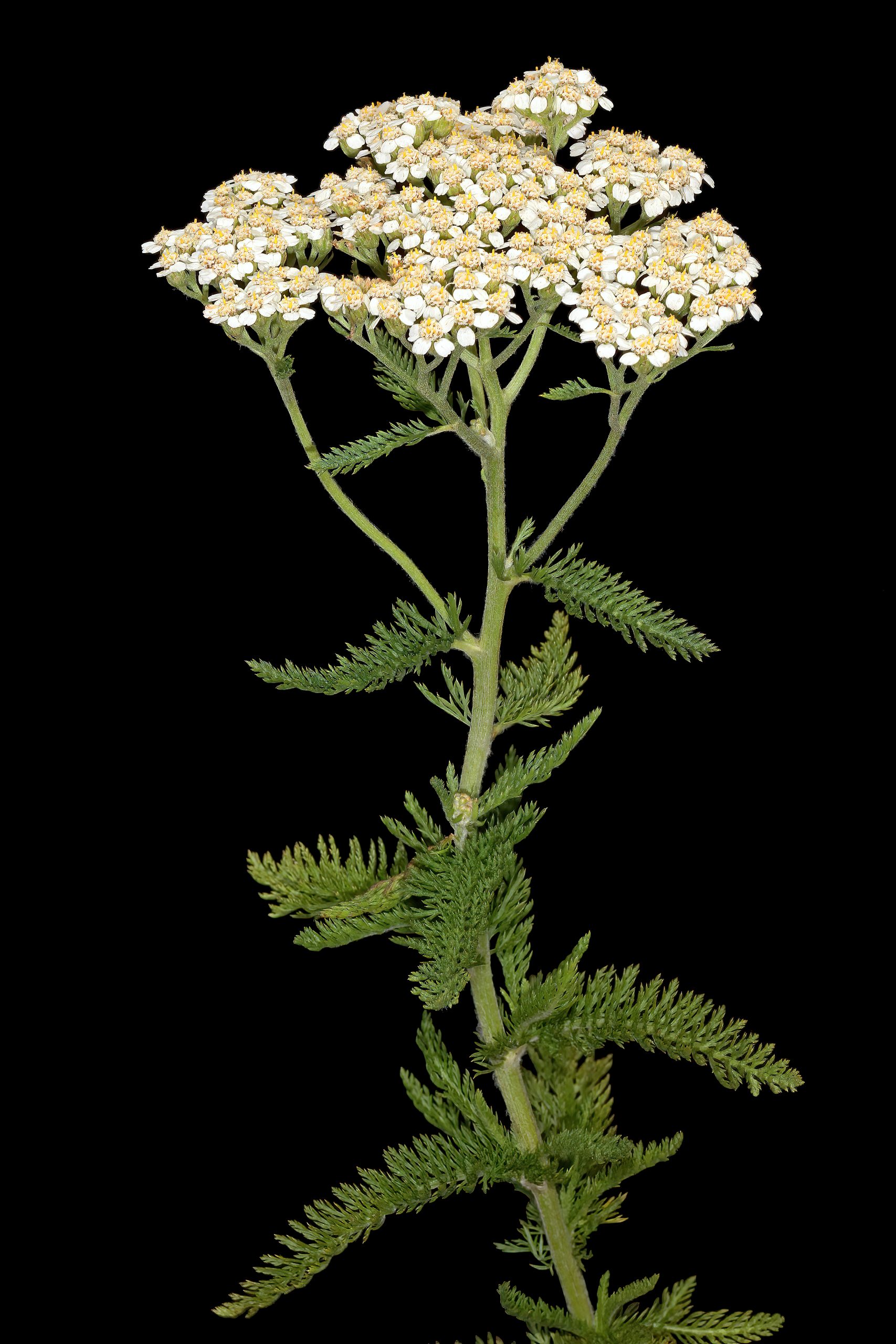Common Names and Other Names:
- Yarrow
- Common Yarrow
- Milfoil
- Soldier’s Woundwort
- Thousand-Leaf
- Nosebleed Plant
- Carpenter’s Weed
Where Does It Occur:
Yarrow (Achillea millefolium) is native to the temperate regions of the Northern Hemisphere, including:
- Europe
- Asia
- North America
It thrives in a variety of habitats such as:
- Meadows
- Grasslands
- Roadsides
- Open forests
- Coastal areas
Yarrow is a hardy perennial that grows in well-drained soils and can tolerate a range of conditions, from full sun to partial shade. It is commonly found in both wild settings and cultivated gardens.
Basic Ingredients (Constituents):
Yarrow contains several bioactive compounds contributing to its medicinal properties:
- Essential Oils:
- Chamazulene
- Camphor
- 1,8-Cineole
- β-Pinene
- Flavonoids:
- Apigenin
- Luteolin
- Quercetin
- Alkaloids:
- Achilleine
- Tannins
- Sesquiterpene Lactones:
- Achillifoline
- Achillicin
- Coumarins
- Salicylic Acid
- Sterols
- Beta-sitosterol
These constituents provide yarrow with anti-inflammatory, antimicrobial, astringent, and antioxidant properties.
Most Commonly Used For Treatment Of:
- Wound Healing:
- Hemostatic Agent: Promotes blood clotting to stop bleeding.
- Antimicrobial: Prevents infection in wounds.
- Digestive Issues:
- Antispasmodic: Relieves stomach cramps and spasms.
- Carminative: Reduces gas and bloating.
- Menstrual Disorders:
- Emmenagogue: Regulates menstrual flow and alleviates menstrual cramps.
- Inflammation:
- Reduces inflammation in conditions like arthritis.
- Respiratory Conditions:
- Eases symptoms of colds, flu, and bronchitis.
- Fever Reduction:
- Induces sweating to help break fevers.
- Anxiety and Insomnia:
- Mild sedative effects promote relaxation and improve sleep.
- Hemorrhoids and Varicose Veins:
- Strengthens blood vessels and reduces swelling.
Side Effects:
While generally considered safe when used appropriately, yarrow may cause:
- Allergic Reactions:
- Skin Irritation: Contact dermatitis in sensitive individuals, especially those allergic to plants in the Asteraceae family (e.g., ragweed, chrysanthemums, marigolds).
- Photosensitivity:
- Increased sensitivity to sunlight, potentially leading to sunburn.
- Interaction with Medications:
- Anticoagulants: May enhance the effect of blood-thinning medications, increasing bleeding risk.
- Sedatives: May amplify the sedative effects of medications and herbs that cause drowsiness.
- Gastrointestinal Upset:
- Nausea or vomiting when taken in large doses.
- Pregnancy Concerns:
- May stimulate uterine contractions; not recommended during pregnancy.
Available Forms in the Market:
- Dried Herb:
- Used to prepare teas, infusions, or decoctions.
- Tinctures and Liquid Extracts:
- Concentrated forms for internal use.
- Capsules/Tablets:
- Standardized extracts for convenient oral consumption.
- Essential Oil:
- Used in aromatherapy and diluted for topical applications.
- Topical Preparations:
- Creams, ointments, or salves for wound healing and skin conditions.
- Flower Essence:
- Used in alternative therapies for emotional well-being.
- Fresh Plant:
- Employed in making poultices or compresses.
Research and Results:
- Wound Healing Properties:
- Study: “Wound healing activity of Achillea millefolium L. extract.”
- Findings: Demonstrated significant wound healing effects by promoting tissue granulation and epithelization.
- Link: PubMed
- Anti-Inflammatory Effects:
- Study: “Anti-inflammatory activity of Achillea millefolium and chamazulene constituents.”
- Findings: Exhibited notable anti-inflammatory properties, reducing edema and inflammation markers.
- Link: ScienceDirect
- Antimicrobial Activity:
- Study: “Antimicrobial activity of the essential oil of Achillea millefolium.”
- Findings: Essential oil showed effectiveness against various bacteria and fungi, including Staphylococcus aureus and Candida albicans.
- Link: PubMed
- Menstrual Relief:
- Study: “The effect of Achillea millefolium on primary dysmenorrhea.”
- Findings: Yarrow extract significantly reduced menstrual pain intensity and duration compared to placebo.
- Link: PubMed
- Anxiety Reduction:
- Study: “Anxiolytic-like effect of Achillea millefolium in animal models.”
- Findings: Indicated potential anxiolytic properties, reducing anxiety-like behaviors in mice.
- Link: ScienceDirect
Precautions:
- Pregnancy and Breastfeeding:
- Not Recommended: May cause uterine contractions; avoid use during pregnancy and breastfeeding unless under professional guidance.
- Allergies:
- Asteraceae Sensitivity: Individuals allergic to ragweed, daisies, marigolds, or chrysanthemums should avoid yarrow.
- Blood Disorders:
- Bleeding Risk: May interfere with blood clotting; exercise caution if you have a bleeding disorder or are on anticoagulant therapy.
- Scheduled Surgery:
- Discontinue Use: Stop using yarrow at least two weeks before surgery to reduce bleeding risk.
- Photosensitivity:
- Sun Protection: Use sunscreen and protective clothing when exposed to sunlight.
- Medication Interactions:
- Sedatives: May enhance drowsiness when taken with CNS depressants.
- Proton Pump Inhibitors and Antacids: May affect stomach acid levels; consult a healthcare provider.
- Children:
- Use with Caution: Not recommended for children without professional supervision.
Conclusion:
Yarrow is a time-honored medicinal herb valued for its versatility in treating a range of conditions, particularly related to wound healing, digestion, and menstrual discomfort. Its rich array of bioactive compounds underpins its therapeutic effects. While generally safe for most adults, it’s important to be aware of potential side effects, especially regarding allergies and interactions with medications. Consulting with a healthcare professional before use is advisable, especially for pregnant women, individuals with medical conditions, or those taking other medications.
« Back to Glossary Index
